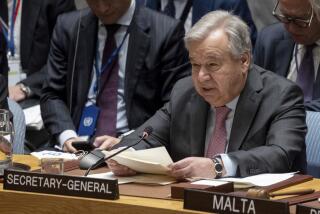7 Nations Labeled Oppressors of Faith
- Share via
WASHINGTON — The Bush administration designated the Taliban rulers of Afghanistan and six other governments the world’s worst persecutors of religious believers Friday, but rejected calls to include other countries that the White House views as key in the war on terrorism.
Human rights groups complained that Saudi Arabia, Turkmenistan and Uzbekistan should have been added to the annual list released by the State Department. The groups charged that the nations were omitted because the Bush administration needs their help in combating the Taliban and Osama bin Laden’s Al Qaeda terrorist network.
The State Department added just one government, North Korea, to its list of the most egregious offenders of religious liberty. The Taliban and the governments of China, Iran, Iraq, Myanmar and Sudan were also on the list last year.
State Department spokesman Richard Boucher said officials did not pull any punches to avoid disturbing the anti-terrorism coalition, noting that China and Sudan have both provided “good cooperation” to the U.S. war on terrorism despite their continued presence on the list.
“Religious freedom remains an important aspect of U.S. foreign policy,” Boucher said.
The State Department is required to issue its list under the International Religious Freedom Act of 1998. The White House, in turn, is required to impose sanctions on the designated countries, although officials are given wide latitude in choosing the penalties. The administration also can waive the sanctions if it deems it would be in the national interest to do so.
The government’s own Commission on International Religious Freedom--an independent body appointed by the president and congressional leaders--had urged the department to add North Korea, Saudi Arabia, Turkmenistan and Laos this year. Non-governmental human rights groups also called for the inclusion of Uzbekistan.
“We are pleased to see that North Korea is a country of particular concern,” said Lawrence J. Goodrich, spokesman for the commission. “We believe that Saudi Arabia, Laos and Turkmenistan are countries of particular concern and should have been so designated.”
Boucher conceded that “there is, essentially, no religious freedom in Saudi Arabia,” noting that the government prohibits the open practice of any religion other than Islam. But he said the situation was unchanged from last year, so “one would not expect the designation to change.”
He made much the same point in discussing Uzbekistan and Turkmenistan, Islamic countries on Afghanistan’s northern border.
“Clearly, the administration doesn’t want to offend the allies through excessive truth telling,” said Tom Malinowski, an official at Human Rights Watch. “The ironic thing is that getting too close to countries that crush religious freedom may be more damaging than keeping our distance.”
The report was sharply critical of religious practices in Saudi Arabia, Turkmenistan and Uzbekistan, even though the countries are not on the list.
Both Uzbekistan and Turkmenistan are accused of persecuting Muslims who refuse to attend state-controlled mosques.
Although China was listed as an egregious offender, the report softened last year’s criticism of its repression of the predominantly Muslim Uighur ethnic group in the Xinjiang region. China claims that anti-government Uighurs are affiliated with Bin Laden’s network.
The report also listed improvements in religious freedom during the past year, placing Mexico at the top of the list.
Other countries where an improving atmosphere was noted included Argentina, Azerbaijan, Bosnia-Herzegovina, the Czech Republic, Equatorial Guinea, Eritrea, Hungary, Indonesia, Jordan, Kazakhstan, Kenya, Mozambique, Nigeria, Peru, Poland, Russia and Rwanda.
More to Read
Sign up for Essential California
The most important California stories and recommendations in your inbox every morning.
You may occasionally receive promotional content from the Los Angeles Times.










